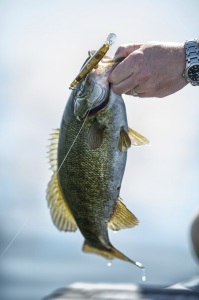Post
Twitching for Smallmouth Bass
Bass (Small & Largemouth), Freshwater Fishing Articles, Freshwater Fishing Tips, Tackle Tips & How To's theangler PM

Wham!
Strikes on suspending jerkbaits or large soft-plastics nipped onto ultra-lightweight jig heads can be so violent, you’d swear it’s more about settling a score than filling the gullet.
Remarkable, though, ferocious strikes can ensue when the water temperature is quite low; downright cold; so chilly, in fact, you wouldn’t think bass could muster such a punch.
But the sun’s springtime rays are slowly warming the lake and—in comparison to the harsh winter conditions the fish just suffered—it now feels basically balmy to these cold-blooded creatures.
Generally, as soon as the temperature readings hedge into the mid-40s, it’s time to throw these two lures, as they can be fished slowly, yet still offer plenty of action.
Enter Michigan bass guide Chris Noffsinger. The smallmouth bass in the Grand Traverse Bays of Lake Michigan and inland lakes near his Traverse City, Michigan, home are his specialty.
The moment Noffsinger notes surface temperatures tickling the 43-degree mark, he rummages through Plano tackle totes in search of a suspending jerkbait. It’s the lure he and his clients use until the water warms into the high 50’s.
“I have my customers pause the bait so long between twitches that some of them actually get bored,” says Noffsinger. “But the next thing you know there’s a big bass engulfs their bait and boredom instantly turns to elation.”
Noffsinger targets water depths from the super skinny, say, 2-feet, down to 18-feet. Here, his tactic is to cast, reel in only a few feet for a quick dive, and then just let the lure sit motionless. Sometimes suspending up to two minutes before giving it another twitch.
“It was quite by accident I found that letting a lure sit suspended in the water column, doing nothing, was a technique,” said Noffsinger. “It started a few years back when I set my rod down to answer my cell phone, and, after several minutes, realized my lure was swimming away.”
When it comes to equipment, Noffsinger uses a 6 1/2-foot medium-action rod with a fast tip. Fluorocarbon of 8-pound test is his line preference. My personal favorite for employing this method is the 6-foot 8-inch St. Croix Legend Tournament Bass in the same action. Superline in the identical test is another low-stretch option that works well for spinning combos.

Motion detector
Sometimes the best trigger for strikes is a lure that falls ultra-slow through the water column, looking like a minnow on its last leg… er, fin.
Soft plastics poured with deep ribs for more water resistance, as well a wide minnow-like profile—such as a 3- or 4-inch Custom Jigs & Spin’s Moxi—will descend at a creep when threaded onto a lightweight jig head like a 1/16-, 3/32- or 1/8-ounce H20 Precision Jig. Just cast it out, give it a jerk or two and let it fall. Another tug or two and the lightweight lure will swim back up, and then fall once more during the pause.

Catch and release is a vital component to a healthy fishery, especially during times when the bite is grand, yet, the fish haven’t even had the chance to spawn.While “lipping” a smallie can be efficient, it can also be dangerous to the thumb of any angler with razor-sharp hooks dangling off lures.
Scooping up a smallie with a quality net, especially one that has a mesh bag that won’t tangle fish and hooks is essential. Frabill’s series of “Crankbait Net” allows hooks to be removed quickly, without tangles, and fish go back without missing a flare of a gill. It’s a healthy release of the fish as well as less frustrating for anglers undoing hooks.
What a relief for both man and fish.
Twitch, There It Is!
If catching (and releasing) a boatload of smallmouth bass is your idea of a grand time the moment the waters start to warm, then by all means give suspending jerkbaits and slow-sinking soft-plastics a try.
Whatever you do, don’t overdo it, but rather work baits painstakingly slow. Let suspending jerkbaits sit longer than you think you should, while letting slow falling plastics take their own sweet time.
Don’t hurry, be happy.
Mitch Eeagan is an outdoor writer who lives and survives off the land within Michigan’s Upper Peninsula’s cedar swamps.
